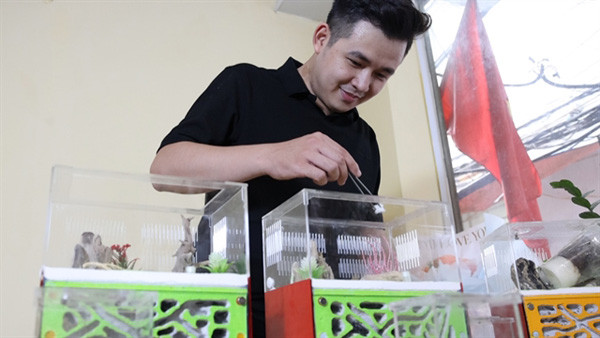He grew up with different pets before taking up his ant-keeping hobby five years ago by watching online videos about indoor ant-keeping.
“I like the feeling of having an ant colony of my own. I like watching them go hunting, clean up their place, and build their nest together," Cuong said.
“I have raised about 30 types of ants. The biggest colony has about 5,000 or 6,000 individuals, and I want to raise even more species in the future.”

Most of the colonies are sourced from regions across Vietnam or shipped from abroad - usually Singapore and China, where the hobby is popular.
With the help of a few locals, Cuong has collected different types of ants from their natural habitat and put them in plastic containers along with a few dried leaves, which are then sealed tight with tape for shipping.
“For the common species, you can raise a colony from a queen or collect one from the natural environment,” said Cuong.
But these are very different from house ants. To pick out the species that can be raised in an artificial container (formicarium) at home, the ant hobbyist has learned from the experience of others.
“It is not difficult once you have some knowledge and skills,” Cuong added.
“The two most important factors to be mindful of are temperature and humidity. You must create conditions for the ants as if they are underground - so they can live and grow indoors.
“When I started, I liked unique, peculiar species. But now I stick to the more ordinary types - especially those that are odourless, easy to adapt, don’t bite, and don’t destroy furniture around the house.”
While these crawly creatures are plenty in numbers, taking care of them requires little time and resources.
Their diet mainly consists of sugar mixed in water, alongside a few bits of protein now and then, like minced meat or small worms.
“It doesn’t require a lot of time - only five to 10 minutes a day, and their food doesn’t cost much either, so it’s very fitting for a busy person like me,” Cuong said.

Beginning from a simple pastime activity, Cuong started sharing his experience online and now has nearly 137,000 followers on his TikTok account.
“People kept asking me if the colonies or the containers are up for sale, so I started providing kits with concise, easy instructions on how to raise ants, along with easy-to-raise species,” he said.
The lower component of the tank is a super-lightweight concrete block with pathways running through it, resembling an ant nest underground. The upper component – a transparent plastic box decorated with replica tree bark and leaves, is where the ants hunt their meals provided by the keeper.
Depending on the ant species and their size, these artificial nests can contain thousands upon thousands of the eusocial insects at the same time.
All the modules of the ant containers can be taken apart for cleaning, which Cuong does for all his ant nests every week.

Cuong designed his ant homes after studying ant nests of other hobbyists on the internet. When the blueprint was finished, he contacted a local manufacturer and started commercial production, which adds a decent income to his regular office job.
Though a niche hobby, the ant-keeping community is growing fast.
“Aside from young people like me, parents also like to buy these for their children so they can have pets to take care of at home. Children can learn about unity, patience and hardworking spirit from the ants," Cuong said.
“The ant-growing community is becoming even more active now.”
Source: Vietnam News